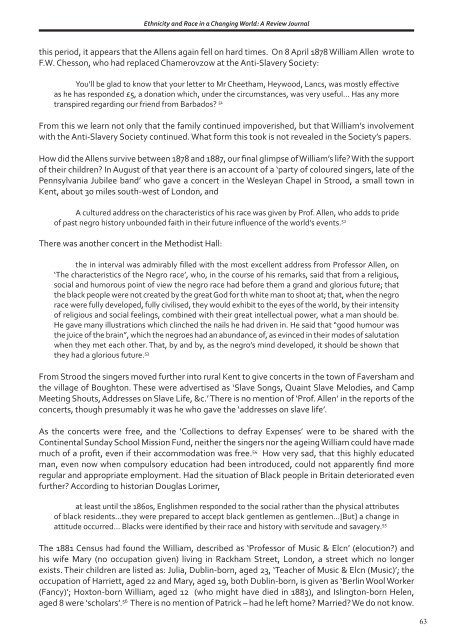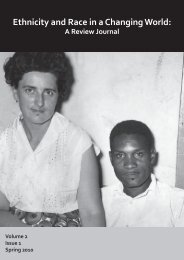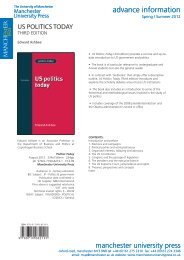Ethnicity and Race in a Changing World
Volume 2, Issue 1, 2011 - Manchester University Press
Volume 2, Issue 1, 2011 - Manchester University Press
You also want an ePaper? Increase the reach of your titles
YUMPU automatically turns print PDFs into web optimized ePapers that Google loves.
<strong>Ethnicity</strong> <strong>and</strong> <strong>Race</strong> <strong>in</strong> a Chang<strong>in</strong>g <strong>World</strong>: A Review Journalthis period, it appears that the Allens aga<strong>in</strong> fell on hard times. On 8 April 1878 William Allen wrote toF.W. Chesson, who had replaced Chamerovzow at the Anti-Slavery Society:You’ll be glad to know that your letter to Mr Cheetham, Heywood, Lancs, was mostly effectiveas he has responded £5, a donation which, under the circumstances, was very useful… Has any moretranspired regard<strong>in</strong>g our friend from Barbados? 51From this we learn not only that the family cont<strong>in</strong>ued impoverished, but that William’s <strong>in</strong>volvementwith the Anti-Slavery Society cont<strong>in</strong>ued. What form this took is not revealed <strong>in</strong> the Society’s papers.How did the Allens survive between 1878 <strong>and</strong> 1887, our f<strong>in</strong>al glimpse of William’s life? With the supportof their children? In August of that year there is an account of a ‘party of coloured s<strong>in</strong>gers, late of thePennsylvania Jubilee b<strong>and</strong>’ who gave a concert <strong>in</strong> the Wesleyan Chapel <strong>in</strong> Strood, a small town <strong>in</strong>Kent, about 30 miles south-west of London, <strong>and</strong>A cultured address on the characteristics of his race was given by Prof. Allen, who adds to prideof past negro history unbounded faith <strong>in</strong> their future <strong>in</strong>fluence of the world’s events. 52There was another concert <strong>in</strong> the Methodist Hall:the <strong>in</strong> <strong>in</strong>terval was admirably filled with the most excellent address from Professor Allen, on‘The characteristics of the Negro race’, who, <strong>in</strong> the course of his remarks, said that from a religious,social <strong>and</strong> humorous po<strong>in</strong>t of view the negro race had before them a gr<strong>and</strong> <strong>and</strong> glorious future; thatthe black people were not created by the great God for th white man to shoot at; that, when the negrorace were fully developed, fully civilised, they would exhibit to the eyes of the world, by their <strong>in</strong>tensityof religious <strong>and</strong> social feel<strong>in</strong>gs, comb<strong>in</strong>ed with their great <strong>in</strong>tellectual power, what a man should be.He gave many illustrations which cl<strong>in</strong>ched the nails he had driven <strong>in</strong>. He said that “good humour wasthe juice of the bra<strong>in</strong>”, which the negroes had an abundance of, as ev<strong>in</strong>ced <strong>in</strong> their modes of salutationwhen they met each other. That, by <strong>and</strong> by, as the negro’s m<strong>in</strong>d developed, it should be shown thatthey had a glorious future. 53From Strood the s<strong>in</strong>gers moved further <strong>in</strong>to rural Kent to give concerts <strong>in</strong> the town of Faversham <strong>and</strong>the village of Boughton. These were advertised as ‘Slave Songs, Qua<strong>in</strong>t Slave Melodies, <strong>and</strong> CampMeet<strong>in</strong>g Shouts, Addresses on Slave Life, &c.’ There is no mention of ‘Prof. Allen’ <strong>in</strong> the reports of theconcerts, though presumably it was he who gave the ‘addresses on slave life’.As the concerts were free, <strong>and</strong> the ‘Collections to defray Expenses’ were to be shared with theCont<strong>in</strong>ental Sunday School Mission Fund, neither the s<strong>in</strong>gers nor the age<strong>in</strong>g William could have mademuch of a profit, even if their accommodation was free. 54 How very sad, that this highly educatedman, even now when compulsory education had been <strong>in</strong>troduced, could not apparently f<strong>in</strong>d moreregular <strong>and</strong> appropriate employment. Had the situation of Black people <strong>in</strong> Brita<strong>in</strong> deteriorated evenfurther? Accord<strong>in</strong>g to historian Douglas Lorimer,at least until the 1860s, Englishmen responded to the social rather than the physical attributesof black residents…they were prepared to accept black gentlemen as gentlemen…{But] a change <strong>in</strong>attitude occurred… Blacks were identified by their race <strong>and</strong> history with servitude <strong>and</strong> savagery. 55The 1881 Census had found the William, described as ‘Professor of Music & Elcn’ (elocution?) <strong>and</strong>his wife Mary (no occupation given) liv<strong>in</strong>g <strong>in</strong> Rackham Street, London, a street which no longerexists. Their children are listed as: Julia, Dubl<strong>in</strong>-born, aged 23, ‘Teacher of Music & Elcn (Music)’; theoccupation of Harriett, aged 22 <strong>and</strong> Mary, aged 19, both Dubl<strong>in</strong>-born, is given as ‘Berl<strong>in</strong> Wool Worker(Fancy)’; Hoxton-born William, aged 12 (who might have died <strong>in</strong> 1883), <strong>and</strong> Isl<strong>in</strong>gton-born Helen,aged 8 were ‘scholars’. 56 There is no mention of Patrick – had he left home? Married? We do not know.63






